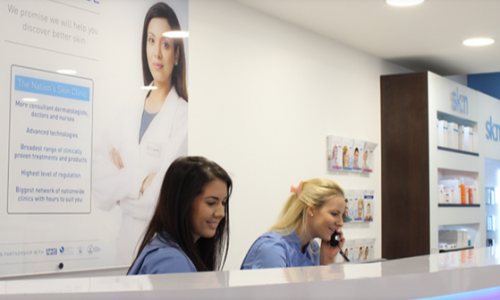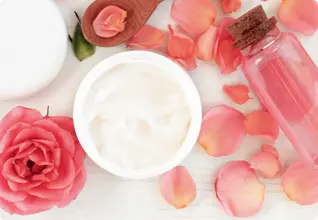Expert Dermatologist Reveals How To Get Your Glow Back Post Lockdown

It’s fair to say our lifestyles drastically changed over the last few months, and this has had a huge impact on our skin.
“Changes in routine and lifestyles, such as increased screen time, stress levels and diet can have a big effect on our skin, and it can take a while for the body to adapt and hormones to settle” says Dr Jinah Yoo, sk:n Consultant Dermatologist.
So, now lockdown rules are easing, what can you do to gradually get back your glow? We’ve spoken to Dr Jinah Yoo, to get her top tips on super skin post lockdown.
Lockdown Issue: Screen Time
On average, Brits spend 2 hours and 34 minutes on their smartphones every day1 and with all the additional Netflix and Zoom calls, many of us have only found our screen time increasing while in lockdown. Blue light is the spectrum of light emitted from the sun as well as digital devices such as mobile phones and computer screens. The full extent of the effects of blue light emitted from tablets and phone screens on skin cells requires more research, however one lab-based study has shown increased free radical production from just 1-hour of screen exposure. These free radicals can contribute to skin ageing and hyperpigmentation.
Dr Yoo’s Recommendation:
Some aesthetic procedures can be combined with prescription-strength topical treatments to combat the signs of skin ageing and hyperpigmentation. Chemical peels, especially glycolic acid peels, can help to lighten some hyperpigmentation and signs of mild skin ageing. Microneedling can help to reduce the appearance of rough skin and wrinkles.
Lockdown issue: Sugary treats:
There’s no denying that many of us have indulged in comfort eating during lockdown, but this has more than just an effect on our waistline. Although skin ageing is a natural process, it can be accelerated by external factors such as a high refined sugars, found in sweets, cakes, biscuits and fizzy drinks, which can cause a break down of collagen fibres, contributing to fine lines and reduced elasticity of the skin.
Dr Yoo’s Recommendation:
Make sure that you have a healthy balanced diet to maintain a good healthy skin. Certain foods can promote natural production of collagen such as bone broth, chicken, seafood, egg whites, citrus, berries, garlic, leafy greens, beans and tomatoes. The use of retinoid on your skin will also help, this is a form of Vitamin A which promotes collagen production, helping to reduce the appearance of fine lines and wrinkles. If your main concern is skin sagging or a tired-look caused by loss of volume on your face, now that dermatology clinics are gradually re-opening, it could be time to book yourself in for dermal fillers or Profhilo®. These are injected into the deeper layer of the skin to help rebuild the skins structure, which gives the skin a fuller appearance.
Lockdown issue: Stress
Lockdown has been a stressful period for many. Stress releases chemicals in the body which can suppress your immune function and is a well-known factor that can contribute to skin ageing as well as make existing skin conditions such as rosacea or acne worse. When someone is stressed their body’s reaction is to increase in endogenous steroids. Steroid production can stimulate receptors in the pilosebaceous unit, which leads to over-activity in the oil gland, resulting in acne.
Dr Yoo’s Recommendation:
There are several effective treatments that can help to alleviate the spots occurring from rosacea and acne. Antibiotics and topical medications can be prescribed and often lead to improvement with spots after about three to six months of treatment. In terms of dealing with redness and flushing from rosacea, laser treatment can be an effective solution in removing these symptoms.
If you have mild acne, look out for a cleanser or spot treatment that contains glycolic or salicylic acid. This helps to exfoliate the surface of the skin and penetrates into pores to remove oils. However, acne is a very complex skin condition which varies greatly from person to person. If you’re suffering from painful cysts or severely lacking in confidence as a result of your acne, my advice would be to book in for a consultation with a professional dermatologist to review your individual case.
Lockdown issue: Climate Control
Prolonged periods inside have also affected our skin. Humans lose about 300 to 400 ml of water through the skin every day and this can be aggravated by a varied temperature combined with low humidity – such as a climate created by central heating or air conditioning.
The top layer of the skin, called stratum corneum, is made up of skin cells and lipids. You can imagine the skin cells as ‘bricks’ and lipids as ‘mortar’ holding bricks together. This creates a waxy coating which helps to prevent water loss through the skin as well as protecting against the environment – such as UV, injuries and infections. When skin becomes dry, this barrier function can be disturbed causing inflammation and irritation.
Dr Yoo’s Recommendation:
Drinking plenty of water and regular application of moisturiser can help to improve the hydration in your skin. A good moisturiser helps to restore the skin barrier to prevent the water loss from our skin. Look out for occlusive ingredients such as petrolatum, lanolin or mineral oils, or ingredients that attract moisture from a surrounding humid environment such as glycerine, urea and hyaluronic acid.
Alternatively, now that skincare clinics are re-opening, a HydraFacial can really help to boost hydration. It uses six steps to refresh dull skin and protect against environmental factors, leaving your skin looking radiant.
Lockdown issue: Excess Hair
With laser hair treatments unavailable to access during lockdown, you may have been waxing or epilating at home instead. However, this can alter the nature of the remaining hair and change the way it responds to the laser in future, not to mention painful! At home IPL kits offer long-lasting results, but they use a broad-spectrum light which is less precise than some other methods. The energy is scattered and therefore weaker than the likes of laser hair removal.
Dr Yoo’s Recommendation:
If you’re halfway through laser hair treatment and yet to get back to your clinic, shaving is actually the preferred method to use in the interim. This is an effective quick-fix and won’t impact your ongoing laser sessions. However, laser hair removal is a long-lasting, versatile solution which can provide a permanent hair reduction of up to 90% after a course of approximately six to eight treatment sessions, with clinics now re-opening, it’s definitely worth getting booked in for a session or consultation.
Related Articles

08
Apr 2024

08
Apr 2024
Request a callback
One of our friendly sk:n advisors will call you to book your consultation.
- More than 450 consultants, doctors, nurses and medical practitioners
- Regulated by the Care Quality Commission, Health Inspectorate Wales and Health Improvement Scotland
- Partner of the NHS
- Rated excellent by our clients on Trustpilot
- Strict safety and care protocols




